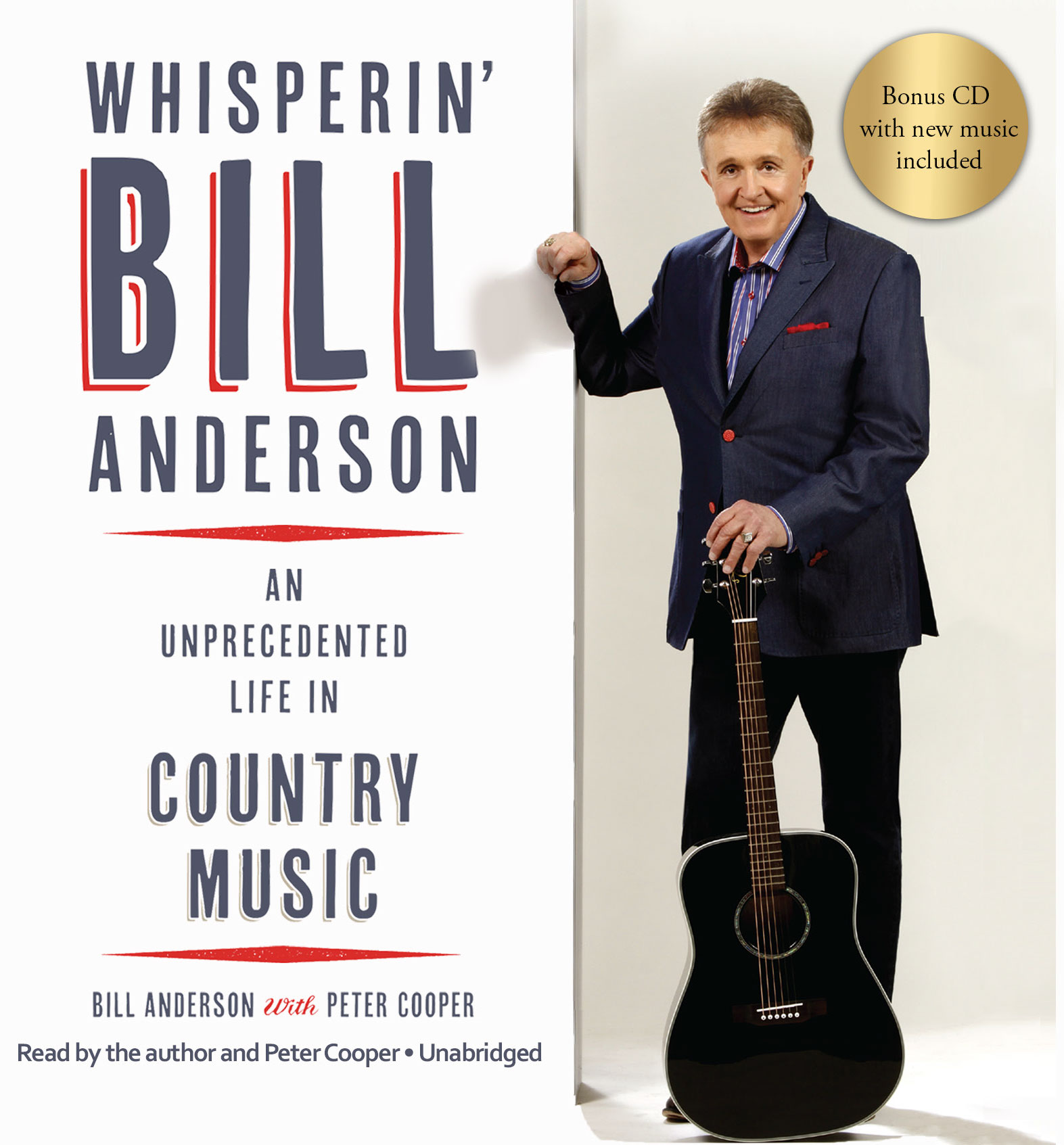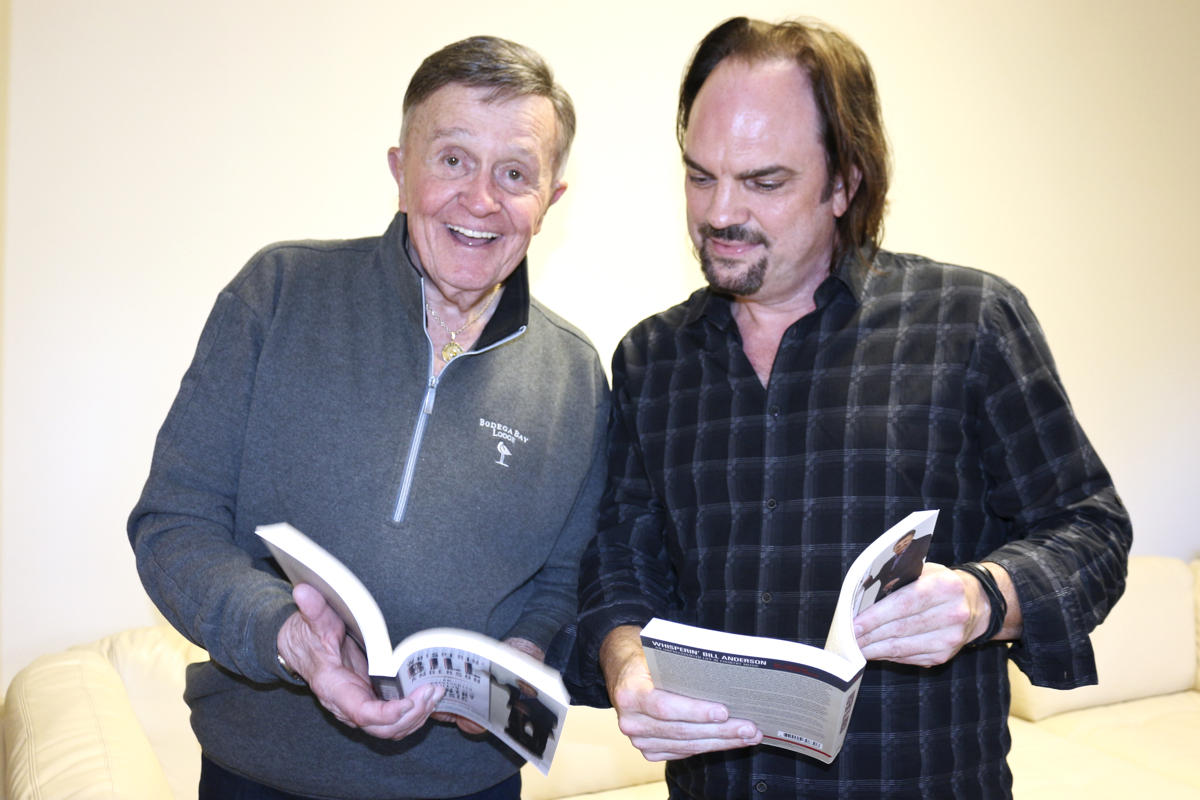

Whisperin’ Bill Anderson: An Unprecedented Life in Country Music is an autobiography that offers an intimate peek inside the life of Bill Anderson, one of the most prolific songwriters in country music history. Anderson’s songs have been recorded by Ray Price, Roy Clark, Eddy Arnold, Steve Wariner, Connie Smith, Lefty Frizzell, Wanda Jackson, Lynn Anderson, Jim Reeves, Conway Twitty, Brad Paisley, Kenny Chesney, George Strait and many, many others. He has also released more than 40 studio albums and has reached the No. 1 spot on the country charts seven times.
MusicRow recently sat down with the iconic tunesmith to talk about his career, his current book, and how at age 79, he is still chasing his childhood dream.
MusicRow: Your first autobiography, Whisperin’ Bill was published in 1989. What was the inspiration behind writing another autobiography?
Bill Anderson: A lot of things happened in my life and in my career between 1989 and 2016. The original book was written following a really turbulent time in my personal life. My wife had been in a terrible automobile accident and she nearly died. She had very serious brain injuries. It was a traumatic time for me. We had a six-year-old son and I was trying to keep my life, my career, and my marriage together. It was very therapeutic to write that book.
I felt like this time, if I was going to write a book, it needed to focus more on the business side and more on the second career that I had been fortunate enough to have. Peter Cooper had a tremendous vision for the new book. I’m not sure that I could’ve done it without him. I was totally shocked when he wanted to do it. Betty Hofer, who was doing PR for me at the time, reached out to Peter. I said, “Betty, don’t waste your time. He ain’t got time to do that.” And low and behold, he jumped at it. When he did that and I saw the excitement and perspective he brought, I thought, “Yeah, this is something I want to do.”
What was it like working with Peter Cooper on this book? What impact did he have on the process?
Well he’s so demanding and he’s so hard to get along with [laughs]. Seriously, Peter is such a great guy! We have so much in common. I was born in South Carolina and he’s from South Carolina. We both love sports, baseball and country music. And we have a really good relationship and friendship, over and apart from the business. He was so accommodating. He would come out to my office and bring his laptop and we’d sit there and talk. I would email him what I had written and he would get back to me on it.
He also gave me the title of the book. I don’t think I would have ever said my career was unprecedented. He saw it from that perspective with me getting away from songwriting and the music business, in general, for a period of almost 10 years. And then coming back and having as much or more success the second time around at an advanced age.

Country artist and singer-songwriter Bill Anderson shares stories of his book, Whisperin’ Bill Anderson: An Unprecedented Life in Country Music, with MusicRow Publisher/Owner Sherod Robertson. Photo: Haley Crow
What was your experience recording the audio for this book?
First, I had no idea how hard it was and how long it was gonna take. Man, you can go in and cut a record and you’re in there for three minutes. For the book, you’re in there for three weeks. Peter knew Thomm Jutz who has a studio at his house out near where I live. Peter had worked on updating Tom T. Hall’s autobiography and had done the audio book. He worked with a lady who produces audio books named Andi Arndt from up in Virginia. And Andi came down and she knew exactly how to do an audio book. I thought, “Well, if I don’t say the word exactly the way I’ve got it written it won’t matter,” but oh yes it did! I would hear, “Oops, you didn’t say that exactly the way you wrote it.”
So the recording of the book has to be verbatim?
Yes, it has to be verbatim which surprised me. And it inhibited me a little bit in the beginning because I’d want to ad lib. But there’s a reason for that. Some people listen to the audio recording and read the book and listen at the same time. And for that reason, you have to do it exactly the same.
The digital recording is so much easier to do than it would’ve been years ago. I produced a series of comedy albums back in the ’80s on Lewis Grizzard. Lewis was a southern humorist; not a comedian. His work was very much in demand. And this was in the days before you could do it all digitally. We were down on the floor splicing tape together, and every time Lewis would say, “Uhh..,” we had to cut that out. So you physically have to cut the tape and tape it back together.
It’s no surprise your book is filled with fascinating stories about your life. You recount how, on your very first tour, you made such little money you couldn’t afford breakfast or gas. And at the same time, you were informed you no longer had enough college credits to graduate. How did you not let something like that derail your dreams?
I probably owe that to my mom and dad because the only thing my mom and dad ever asked me to do, was to graduate from college. They let me run around when I was in high school, play music all hours of the night. They never tried to push me away from a career in music, but at the same time they said, “Whatever you do, please get that education.” It would’ve broken my mom and dad’s heart [if I didn’t graduate].
I was only five credit hours short. And so I found a summer school in Atlanta at a little college called Oglethorpe University, which oddly my dad had attended when he was young. They had the shortest summer school I could find so I left Nashville and packed it up and went back to Atlanta and lived at mom and dad’s. Oddly enough, during those five weeks living at their house, I wrote some songs, some that got recorded– so it wasn’t a total waste of time. [laughs]
And perhaps I didn’t get discouraged because on that very first tour, we laughed so much that we didn’t notice how hungry we were. When you’ve got Bill Anderson, Roger Miller and Donny Young, who later became Johnny Paycheck, all riding in a car driving through Arizona, it’s hard to get too depressed.
Although you had achieved tremendous success, you experienced some tough times both in your career and financially in the early 1980s. In the book, you are very candid about this experience. Why did you want to share such a personal part of your life?
I don’t know. I think I probably thought if I was reading a book about somebody, I’d want to know as much about them as I could find out. I wasn’t ashamed of anything that happened. I was lucky enough to come out on the other side of it. Maybe by sharing it, I could inspire somebody else along the way. It was tough. I feel very fortunate and very blessed that I was able to work through it. It never occurred to me not to share it.
What was the biggest impetus that pulled you out of that, to keep you going with the second half of your career?
It’s when Steve Warner recorded and had a number one record with “The Tips of my Fingers,” a song I had written 32 years before. That was a wake-up call. I thought the music business had passed me by. I thought I had nothing left to say, nothing left to offer. And here’s this song that I wrote 32 years ago that goes to No. 1. One day it just dawned on me, “You know, I could write another song like that.”
And we didn’t have No. 1 parties when I first came along in the music business. And my goodness gracious, I had no idea how the numbers had changed, how much more money you could make from a song in 1992 than you could in 1962. That’s when I really begin to think about getting back in and trying to write. I had really been away from it. Everybody was co-writing and the music was changing. I’m thinking, “I don’t know these people and they don’t know me.” I called Vince Gill and I said, “Wait a minute, maybe I can do this.” And so Vince was such an inspiration and a big help to me.
On the other side of the coin, you’ve interviewed almost everyone in this business. What was one of your most memorable interviews you’ve ever conducted with an artist?
I was interviewing Merle Haggard one time when I did the “Bill Anderson Visits With The Legends” on XM Radio. I didn’t know Merle all that well but I did know him because we worked the occasional date together. And I was sitting there having a good time with him. He’s opening up to me and we’re talking about all kinds of things. Somewhere off the top of my head I said, “Merle, I’ve never told you this. I’ve never had the chance to. But I want to say this to you while I’m looking at you face-to-face.” I said, “You’re my favorite country singer.” And he just stared at me for minute, and he didn’t speak. I looked over there and a tear started running down his face.
It absolutely got to him. And I said, “Man, I didn’t mean to make you cry. I’m just trying to pay you a compliment.” He was very gracious and said it just meant a lot to him for me to say that to him. That was very memorable.
I enjoy being on the other side. I think being on both sides of the microphone has helped me. I think as an interviewer, having been the interviewee so many times, I think I know a little bit more about what to ask somebody, and maybe what not to ask them.
Last question: You wrote your first song at age 10. You started your first band at 15 and began chasing your dreams of a career in music. Is there part of you still chasing those dreams?
It’s sorta like the dog that chasing cars all of his life. He finally catches one and doesn’t know what to do with it.
If I ever caught my dream, I wouldn’t know what to do with it. The fun is in the chase.
The related audio CD of the book, Whisperin’ Bill Anderson: An Unprecedented Life in Country Music, is also available and is up for Grammy consideration for Best Spoken Word Recording.

About the Author
Sherod Robertson is President and Owner of MusicRow Enterprises. He oversees all operations and develops strategic initiatives for MusicRow magazine, RowFax, and MusicRow's CountryBreakout chart. Robertson previously served as Director of Finance of Arista Records after beginning his career as Vice President of Finance and CFO at Reunion Records.View Author Profile


